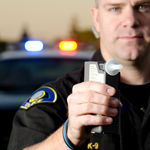In terms of determining a driver’s level of sobriety, one or multiple sobriety tests must be administered prior to a DUI arrest. These tests, which determine the presence of drugs and alcohol in the blood-stream are either field sobriety tests or chemical tests. Field sobriety tests are administered in an effort to determine a driver’s mental awareness and physical ability to safely operate a vehicle. Such tests monitor whether or not a driver’s abilities are impaired by either alcohol or a controlled substance. Chemical tests employ either a breathalyzer or blood test to determine whether a driver’s Blood Alcohol Concentration (BAC) of 0.08% or greater. For drivers under the age of 21, a zero tolerance policy is applied with any BAC over 0.00%.
Field Sobriety Testing
Prior to a DUI arrest, a field sobriety test or chemical test must be administered. A field sobriety test is a preliminary measure employed by law enforcement wherein they may request driver’s to partake in at a DUI checkpoint or legal traffic stop. With field sobriety testing there are generally four options:
- The One-Leg Stand: Suspect stands on one leg maintaining balance
- The Horizontal Gaze Nystagmus: Law enforcement office tracks eye movement of a suspect with their finger or an object such as a pen
- The Walk-Around-Test: Suspect walks in a strait line, turns around, walks back the same way
- Alcohol Screening Device (PAS): Portable machine that tests alcohol content in suspect’s breath
Chemical Testing – Phoenix Drunk Driving Tests
Prior to a lawful arrest, law enforcement officers must administer a chemical test to drivers suspected to be operating their vehicle under the influence. There are generally three types of chemical tests administered by law enforcement or licensed professionals that measure one’s Blood Alcohol Concentration (BAC). These tests include:
- Breath Testing
- Blood Testing
- Urine Testing
In general, blood and urine testing for DUI’s are often associated with extreme DUI situations and/or the suspected use of illegal drugs. In situations where suspects refuse to partake in a chemical test they may be subject to automatic license suspension.
Arizona Blood Alcohol Concentration (BAC) Ratios:
- Under 21 years of age: 0.00% (Zero Tolerance)
- 21 years of age or older: 0.08%
- Commercial Vehicle Operator: 0.04%
- Extreme DUI: 0.15% or higher
Chemical testing that results in a blood alcohol concentration of 0.08% or higher may result in the automatic suspension of one’s license and a formal DUI charge, bit that does not automatically suggest guilt or conviction. As a citizen, you have certain inalienable rights, including representation by a skilled DUI defense lawyer.
Breathalyzer Testing
Proving the inaccurate reading of a breathalyzer test by a law enforcement officer may have a profound impact on your DUI case. A comprehensive understanding of breathalyzer tests and possible malfunctions that may occur as a result of testing is essential for an effective DUI defense lawyer. In some cases, a breathalyzer test can fail due to malfunctioning equipment, incorrect administration or a suspect’s physical or medical condition falsely affecting test results. Breathalyzer equipment must be properly maintained and calibrated for accuracy, which may affect test results and the law enforcement officer or licensed professional responsible for administering the test must be properly trained in the appropriate process. Under some circumstances, suspects with certain medical conditions may even impact the accuracy of a breathalyzer test.
Blood Testing for DUI
A blood test may be administered by a law enforcement officer or licensed professional following a DUI arrest by taking a small sample of a suspect’s blood to determine the blood alcohol concentration (BAC). Based on the results of the blood test, a driver is found to be driving under the influence if his or her blood alcohol concentration is 0.08% or higher, 0.00% for a minor or 0.04% for a driver in possession of a commercial driver’s license (CDL). A skilled DUI defense lawyer will know that there are ways in which to challenge the results of a blood test. Test evidence may be challenged if the test was not administered by a trained or qualified professional, the sample was mishandled or not preserved properly, the test kit had expired or there was a discrepancy in who had possession of the sample from beginning to end.
DUI Breath Test Refusal
If you refuse to participate in a breathalyzer test upon being pulled over for suspicion of driving under the influence, your driver’s license will be automatically suspended. Having the experience of a skilled DUI defense lawyer on your side is essential throughout this challenging scenario and the Attorneys at Criminal Defense Lawyers PLLC can assist you through the process.
Accuracy of Sobriety Testing
In all testing, there is a margin for error and sobriety testing is no exception. According to the National Highway Traffic Safety Administration (NHTSA), the most accurate field sobriety test – The Horizontal Gaze Nystagmus – achieved an accuracy rating of 77% in a test evaluation. The one-leg stand achieved an accuracy rating of 65% and the walk-and-turn test achieved a rating of 68%. Contributing factors to test inaccuracy have been unclear instruction by law enforcement officers, elderly, overweight and/or nervous suspects, fatigue and pre-existing physical or medical conditions.
Contact a Skilled Phoenix DUI Drunk Driving Tests Lawyer Today
Having a DUI conviction on your criminal and driving records will haunt you for years, perhaps even decades to come and sound and reliable legal counsel will impact the outcome of the court proceedings as well as your DMV hearing. Seeking the assistance of a skilled DUI defense lawyer is highly advised and with a wealth of expertise, a commitment to integrity and a passion for defense, the Attorneys at Criminal Defense Lawyers PLLC – Arizona DUI Defense Lawyers – are here to support you with your DUI case. We believe every defendant has the right to a solid defense. Call today for a free initial consultation at 877-887-4541.
[h4a]Phoenix DUI Defense Lawyer[/h4a]
Regardless of your conviction, as a citizen you possess certain constitutional rights that it is critical you are aware of. In many situations, law enforcement personnel have been known to prey on the fact that people do not understand their rights and are subjected to preventable situations…Read More
Driving under the influence of an illegal substance in the state of Arizona is met with extreme consequences that range from stiff fines to a felony charge and prolonged incarceration. Depending on the logistics of a particular DUI case, incarceration may be as brief as 24 hours or years and license suspension may range from 90 days to a permanent loss…Read More
Being convicted of one DUI charge is detrimental enough, but when you face the reality of another arrest related to driving under the influence and already have one or more DUI offenses on your driving and criminal records, you are looking at heavy fines, prolonged prison time and a possible felony conviction. Aligning yourself with an attorney skilled in Arizona specific laws pertaining to multiple DUI arrests is essential to the protection of your record, your reputation and your peace of mind…Read More
Being convicted of a felony is perhaps the worst charge you can have on your criminal and driving record. A felony charge often results in prolonged imprisonment, crippling fines and excessive legal expenses. In the state of Arizona, a 4th DUI conviction or a DUI charge involving a serious injury or vehicular manslaughter will result in a felony conviction…Read More
Phoenix DUI Out of State DUI Lawyer
Being arrested for driving under the influence (DUI) while traveling or living in another state creates unique legal challenges where you may be penalized in both your home state and the state in which the DUI incident occurred. Arizona and 44 other states comply are in compliance with the International Driver’s License Compact, an interstate compact used to exchange information concerning license suspensions and traffic violations of non-residents…Read More
Phoenix DUI Drunk Driving Tests
In terms of determining a driver’s level of sobriety, one or multiple sobriety tests must be administered prior to a DUI arrest. These tests, which determine the presence of drugs and alcohol in the blood-stream are either field sobriety tests or chemical tests. Field sobriety tests are administered in an effort to determine a driver’s mental awareness and physical ability to safely operate a vehicle…Read More
Phoenix DUI Offenses for Underage Drivers
Drivers under the age of twenty one who are arrested for suspected driving under the influence (DUI) face an immediate “zero tolerance” when it comes to their blood alcohol concentration (BAC). Seeking the assistance of a skilled DUI defense lawyer is highly advised and the Attorneys at Criminal Defense Lawyers PLLC will support you in understanding the legal process and developing your case…Read More
Phoenix Commercial DUI Defense Lawyer
Being arrested for driving under the influence (DUI) as a driver carrying a commercial driver’s license (CDL) carries specific penalties that differ from regular drivers. Commercial drivers carry a higher level of responsibility for safety and adherence to traffic laws based on the fact that they represent various companies and businesses…Read More
Phoenix Court Process for a DUI
In the state of Arizona, the DUI court process begins with a DUI arrest. In most cases, law enforcement is motivated to pull over a potential DUI offender based on speeding, reckless driving, aggressive driving or erratic driving. Blood Alcohol Concentration (BAC) Tests or Breathalyzer Tests are administered upon pulling over a potential offender…Read More
Phoenix Drug & DUI Arrests Lawyer
In the state of Arizona, the DUI court process begins with a DUI arrest. In most cases, law enforcement is motivated to pull over a potential DUI offender based on speeding, reckless driving, aggressive driving or erratic driving. Blood Alcohol Concentration (BAC) Tests or Breathalyzer Tests are administered upon pulling over a potential offender…Read More









